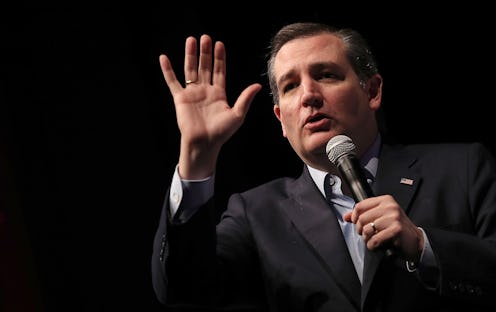News
Ted Cruz Probably Won't Do Great In Connecticut
Come Tuesday, the presidential primaries in Pennsylvania, Maryland, Connecticut, Rhode Island, and Delaware will all take place, and the respective races on both sides of the aisle will move closer toward final results. After the New York primaries on April 19, Donald Trump is the only Republican candidate with the potential to secure the required 1,237 delegates for the Republican nomination. However, Ted Cruz can prevent Trump — who currently holds 845 delegates — from reaching that number by winning just enough states to hold him back. What are Cruz's odds of winning the Republican primary in Connecticut, the state with the second-highest number of delegates up for grabs Tuesday?
For one thing, in this particular race, it's looking like John Kasich might actually have a stronger chance of taking delegates from Trump. Connecticut, a northeastern state in more liberal New England, has a higher rate of educated citizens than the national average, with 89.5 percent of the population over 25 years of age having a high school diploma, and 37 percent having completed a bachelor's degree in college or higher. FiveThirtyEight reported that in New Hampshire, Kasich received the highest percentage of well-educated voters' support. Compounded with left-leaning New England culture, which voted blue back in 2012, Connecticut is ideologically less likely to support a far-right candidate like Cruz.
Additionally, a Quinnipiac poll reveals that Connecticut Republicans prefer a political outsider for president over a career politician by 59 to 33 percent, which doesn't bode well for Cruz.
The projected results via FiveThirtyEight more or less align with ideological lines. FiveThirtyEight predicts a Trump win with 45.2 percent of the popular vote, followed by Kasich carrying 31.7 percent, and Cruz falling behind with 21.3 percent.
According to the CT Mirror, there will be 28 Connecticut delegates at the Republican National Convention in Cleveland, Ohio in July, who must first vote for their assigned nominee. If nothing is decided, the delegates of most states, including Connecticut, would then no longer be committed to support the particular candidate to whom they were previously aligned. No matter the specifics, Cruz would still require a contested convention to win the nomination.
Since Connecticut is not winner-take-all, the winner in each of the state’s five congressional districts will receive three delegates. The remaining 13 at-large delegates are determined by the total number of votes for each candidate, unless any one candidate receives over 50 percent of the vote, in which case they would receive all of them. As it stands now, Trump has 845 delegates, Cruz has 559, and Kasich has 147.
Of course, nothing is set in stone at this point, and throughout this series of caucuses and primaries, more than a few surprises have arisen. Despite the aforementioned predictions, Connecticut has the chance to make anything happen.
Editor's note: This article has been updated from its original version.
